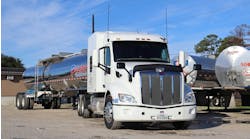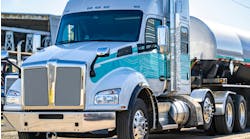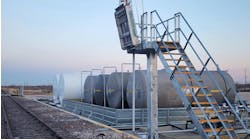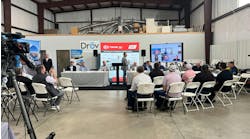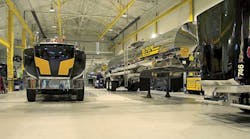Thomas Warren Jr. is proud to represent the third generation of Warrens to lead Al Warren Oil and Altom Transport.
He’s also determined to make sure he’s not the last.
“This business means everything to me,” Warren said. “It’s something that my grandfather and my father gave everything to build.
“They laid a great foundation, and I plan on passing it to my sons.”
To do so, he has to finish guiding the family’s companies through a trying era defined by a global pandemic that forced an estimated one-third of all small businesses in the U.S. to close their doors—many of which never reopened.
So far, so great for the still-growing group of tank truck companies.
Transportation challenges exacerbated by the ongoing health crisis include driver and mechanic shortages, supply-chain constraints, and cybersecurity breaches. But Al Warren and Altom not only have evaded those traps, they’ve thrived, adding two new locations in Louisiana, and growing combined revenues by 20% in 2021.
The keys to their enduring success include enhancing marketing efforts, further separating and distinguishing the group’s unique operations and customer bases, and boosting information technology (IT) security and connectivity, while keeping an ever-watchful eye on driver safety and equipment maintenance.
But for Altom’s operations director, the not-so-secret ingredients are simpler.
“You’ve got to remain competitive, keep your finger on the pulse of what’s going on, and listen to your people,” Dennis Moriarty said.
“You want to acknowledge any safety concerns, first and foremost, and take the worry out of an employee’s mindset. Drivers have enough worries being on the road, with driving defensively, and getting product from Point A to Point B safely. So anything we can do in regard to arranging deliveries is helpful. It’s support—just basic support.
“We’re here to support the drivers, mechanics, and staff, because without those folks doing what they do, we wouldn’t have our jobs.”
And fully invested family backing continues to buoy everyone involved in the business.
“It is a great incentive to be able to say we’re still a family-owned company, for the employees who work here now, and in helping attract future employees,” said Nick Anderson, Altom’s director of fleet maintenance. “Everybody knows they’re very involved in day-to-day operations. They have a huge say in what goes on, as far as how we deal with customers, the maintenance and purchasing of new equipment, and many other decisions.”
Working as one
The family has been hands-on from the beginning. It’s who they are.
Aloysius Warren founded his namesake petroleum-marketing operation in 1948 after serving in the Navy during World War II. They primarily delivered home heating oil in the Greater Chicago area early on. He and his son, Thomas Warren Sr., started Altom (Al + Tom = Altom) in 1978. The elder Thomas retains the titles of president and CEO of both companies, but Thomas Warren Jr., the executive VP, assumed command of day-to-day operations in 2008.
Yet he’s still happy to jump in a truck for an emergency delivery—and bring his boys, now 10 and 13, along for the ride.
“I still have my CDL,” he said. “So I’ve taken them in a truck couple times. They’ve been out and about. They definitely know what a truck is, they know what a tanker is, and they know what I do. So it’s in our blood. I was always around trucks younger than them, crawling inside, cleaning and polishing them, and eventually working on them and driving. My father told me a long time ago, ‘You’re going to do everything, so you never have to ask someone to do something you wouldn’t do.’ So every job, clean or dirty, I’ve done it.”
The family of companies now includes Altom’s Canadian entity (with 25 drivers), and Excel Environmental, acquired in 2019, which recovers and recycles oil, water, and glycol.
Warren estimates the group enjoyed triple-digit growth over the last 15 years. They now have nine combined U.S. locations, and three in Canada. Chicago is home to Al Warren, and Hammond, Ind., serves as the head office for Altom and Al Warren. The Houston-area terminal in Pasadena, Texas is a key hub for Altom’s Gulf Coast operations, which now include Louisiana terminals in Lake Charles (November 2020) and Geismar (March 2021). “Outside of Texas and Chicago, Louisiana is the biggest chemical market in the United States,” Moriarty said. “We realized we weren’t there, and we had a lot of customers requesting our services in that area.”
Al Warren, a distributor for Chevron, CITGO, Goodyear Lubricants, and VP Racing, primarily services the Great Lakes region. Bryan Gaddis, Al Warren’s director of operations, estimates 80% of the 100 million gallons of fuel Al Warren delivers each year is diesel for government entities and private fleets. They’re also big in lubricant delivery and marine refueling, and offer locomotive fueling, tank installation, fuel management, and emergency spill response.
Altom, serving the Midwest, Northeast, and Gulf Coast, hauls petro-chemicals, motor and aviation fuels, lubricants, special wastes, and other chemicals and petroleum products across the United States. It is Coast Guard certified, a Responsible Care partner, and an EPA SmartWay for-hire carrier. Top chemical-producing customers include Cargill, Phillips 66, BP, and INEOS Chemical.
Combined, the group employs 450 people, including company and owner-operator drivers, boasts a fleet of more than 400 trucks and 750 trailers—and generates $304.5 million in annual revenues, with Al Warren leading the way ($210 million). And the explanation for their prosperity is easy to pinpoint for Warren.
“It’s surrounding myself with good people,” he said. “I’m thankful for my management team and my drivers. We have a lot of long-term employees who have been with the company for 25-plus years.”
“So I’m very grateful for everyone that’s been a part of this organization.”
Separate but equal
A recent initiative called for greater separation of the Al Warren and Altom businesses, for accounting purposes, and to better serve their unique customers. While Al Warren’s mostly are local, Altom’s customers are nationwide, and those differences are reflected in their equipment and services provided. “An Al Warren Oil customer may get serviced every day with a fuel delivery, whereas we may only see our customers on the Altom side once a week, or once a month, Anderson said. “So there are many differences between the two, even on the sales side, for how they visit customers, address their needs, and communicate with them.”
Previously, one person was responsible for maintaining both fleets. Now Anderson oversees Altom’s, and Scott Blum is Al Warren’s maintenance director. The division allows them to better manage their respective equipment, while continuing to ensure that every vehicle in the combined fleet receives equal care.
That starts with fervent dedication to preventative maintenance.
Al Warren’s “six-wheeler” tank trucks are serviced every 60 days, and Altom’s long-haul tractors are cycled in every 90 days, regardless of hours operated or miles driven since their last checkup. “We focus on sticking to our PM schedules religiously, and that includes all the other PMs that go along with that, whether it’s a crank case, air filter, air dryer, overhead set, or DPF (diesel particulate filter) cleaning—all of that stuff is done early in our fleet, so we stay ahead of the game,” Blum said. “The condition doesn’t really matter to us.
“If it’s six months on an air dryer cartridge, we change it.”
Most trucks in both fleets are Peterbilts with Cummins engines. Tank-wagons primarily are Peterbilt 348s, and the over-the-road trucks are 579 daycabs and sleepers. Blum said most maintenance tasks are performed in-house using their suppliers’ diagnostic tools, like Cummins INSITE, Bendix ACom, and Eaton ServiceRanger.
Trailers primarily are sourced from Polar Tank Trailer. Most are spec’d with Civacon overfill protection, Hendrickson TIREMAXX tire pressure control systems, super single tires, and disc brakes. Registered inspectors at the companies’ main terminals perform critical annual and five-year cargo tank inspections. “If you don’t see them every 90 days, and keep an eye on everything, you can lose a trailer pretty fast,” Blum said. Shell repairs are outsourced to preferred vendors, like Jacob Press Sons in the Midwest.
Further trailer equipment includes Roper pumps for lubricants, Blackmer pumps for fuels, Fill-Rite pumps for storage tanks, and Littlejohn hoses.
Equipment demand
Moriarty insists customers and drivers appreciate their well-maintained equipment. Ownership’s investments in the fleets and facilities are easy to see, helping to distinguish them from the competition. “That’s always been our philosophy, from my grandfather to my father,” Warren said. “If you give the drivers the best and safest equipment available, they’ll be happy to go to work every day. Our image is based on our equipment, and our drivers reflect that as well. They’re proud to drive up in a new piece of equipment.”
However, providing new trucks is trickier than ever.
Typically, Warren says, Al Warren and Altom bring in 40 new tractors a year. Last year, they received zero new trucks from Peterbilt, which pushed all their 2021 orders into 2022, forcing them to look to the used market. “It’s one of the biggest struggles the transportation industry has seen,” Blum said. “We’ve always bought new equipment, but we purchased 10 used trucks in the last year because we can’t get our hands on anything new.”
Blum’s hoping they receive a few new trucks in the first quarter. In the meantime, they’re extending trade cycles and redoubling efforts to keep older trucks going. That hasn’t required them to cannibalize idled trucks so far, but that could be coming as ongoing supply-chain disruptions also make it harder to track down new parts, forcing parts departments to work the phones overtime searching for new vendors and dealers.
Fortunately, Moriarty says, they have one of the most persistent parts guys around.
“George Falk, who runs our parts department, has a great relationship with our vendors, and he has for the last nine years,” Moriarty said. “So when George calls, he’s very specific, because he knows what he’s talking about, but he’s also very understanding and appreciative of their efforts. And that works in our favor, because most of our vendors will go above and beyond for us, because of their relationship with George.”
Drivers are equally appreciative of Falk’s efforts to keep them on the road.
“Their whole goal is to get here, get their work done and go home, and get a paycheck,” Blum said. “The last thing they want to be is docked somewhere or sitting on the side of the road, and not getting back to their families.
“So maintenance to the drivers is incredibly important.”
Driving success
Drivers are incredibly important to Al Warren and Altom, so they’ve modified pay to show their appreciation—and to ensure drivers remain on board amid a shortage American Trucking Associations says is worsening.
Altom’s company drivers now average $75,000 a year, with top guys earning as much as $120,000 annually, and some owner-operators making more. “We changed our pay policy six months ago, and now it goes on revenue attainment,” Moriarty said. “So the more revenue you generate, the bigger share you earn. That incentivizes drivers to maximize their revenue, take on the big jobs, and provide extra capacity for our customer base.”
Improving pay and benefits helps, but a lot of trucking companies are doing that, so Al Warren and Altom also are boosting branding efforts. They recently enlisted Chicago’s Soaring Badger Productions to showcase tank trucks in action from awe-inspiring angles. New marketing manager Kevin Pasciak also revamped their websites and social media channels to revitalize recruiting, and better showcase their compensation package.
“We are outpacing companies five to eight times our size, in regard to new followers or people contacting us through our website, and it’s because of the high-quality product Kevin is putting out there, highlighting our people, equipment, and facilities,” Moriarty said.
Gaddis agrees, saying those efforts have helped increase the number of viable prospects, even as more traditional methods, including word of mouth, fail to keep a line at the door. But in a sign of the times, he says they’re seeing more transitory candidates, who perhaps are pursuing new careers amid the ‘Great Resignation.’
“The demographic has definitely grown in age,” he attested.
Working in a specialized segment of the industry, where driving often is the easiest part of the assignment, doesn’t help.
“You’re not just looking for a truck driver, you’re looking for a tanker driver, so you’re looking for a specialized truck driver,” Moriarty said. “It’s the same thing with the mechanics. You’re not just looking for a mechanic, you’re looking for, most of the times, a registered tank inspector. That makes it more challenging.”
Safety investments
When they find them, they keep them safe, at all costs.
“If it’s not safe, we don’t do it. Period,” Warren said. “We don’t have a budget for safety. If there’s a better way, we do it.”
Moriarty says they’ve achieved “spectacular” results over the last five years with their Compliance, Safety, Accountability (CSA) scores—which also makes their insurance broker captive partners happy—through standing safety meetings, clear roadside-inspection rewards, and safety bonuses for drivers and mechanics, who work together to promote safety. “That encourages and reinforces proper pre- and post-trips, which are half the battle,” he said.
Recent safety investments include rolling out Netradyne’s fleet safety camera system. They’re already in all Al Warren trucks, and are expected to be installed across the group by the end of 2022. “It’s very user friendly,” Gaddis said. “It provides a list of metrics you can tailor for your operation, and you can receive driver scores on a daily basis based on criteria you choose. You can see if a driver has a bad habit, or if they do something positive, it affords safety and management instant views, and has quick turnaround for praise or critique.”
Moriarty said drivers initially were hesitant about cameras. Now they routinely ask management to review footage—and marvel at a near miss. When an incident can’t be avoided, they don’t summarily dismiss drivers either. Instead, a safety committee reviews incidents to consider contributing factors before a decision is made.
Training videos, created in house and offered through an online service, help prepare drivers for an array of delivery scenarios. The companies also work with emergency responders to help educate them on tank trailer safety.
As Gaddis sums it up: “Our safety and training departments essentially are one and the same.”
IT upgrades
Of course, nothing works if the technology’s not safe, and sound.
That’s why the group has poured significant resources into stepping up its information technology security and connectivity under IT director Matthew Nieciunski, who says optimizing and protecting systems is critically important in a digital age. “That’s my biased professional opinion, and someone may say otherwise, but a sound, stable, secure IT strategy is extremely important to any organization with a 365 by 24/7 operation,” he said.
Recent measures include relocating the group’s servers to Digital Realty, a Tier 4 data center in downtown Chicago with redundant internet and power that now houses its private-cloud infrastructure, and serves as the central hub for all locations. “All of our offices throughout the country were able to experience faster performance and better connectivity because of the relocation,” Nieciunski said. He also secured firewall protection from rising cybersecurity firm Fortinet; and the considerable resources of a threat detection and remediation platform that unlocks world-class anti-malware, anti-ransomware, and intrusion-prevention abilities supplemented by artificial intelligence and a security operations center.
They’ve also reduced billing times by using optical character recognition (OCR) technology to digitize bills of lading and other paperwork, and rolled out new real-time tank-monitoring capabilities leveraging 4G cellular technology.
“At the end of the day, the improvements we are implementing throughout the ecosystem are impacting everyone in a positive way,” Nieciunski said.
Transformative improvements
And the group could use a little positivity.
The last two years certainly haven’t been easy. The companies endured plenty of complications, including COVID restrictions and recoveries, while trying to keep employees safe and customer-service levels high. They persevered through employees’ resilience—and ownership’s commitment to retaining every worker.
“We didn’t lay off anyone, and we’re proud of that,” Warren said.
Now fleets are running lean, and managers are battling capacity constraints, but Warren won’t be deterred from targeting the type of growth that ensures Al Warren and Altom stick around for another three generations.
“We’re always trying to optimize our empty miles, which we’re getting better at every day, and technology is playing a role in that,” Warren said. “Trying to find equipment to grow is a challenge in itself, but we have some good things on the horizon—and we’re going to be popping up in markets we haven’t explored before.”




